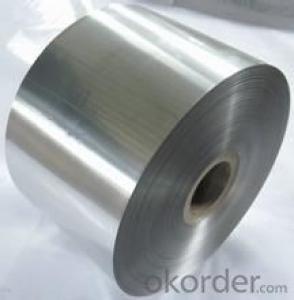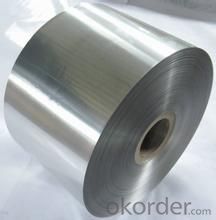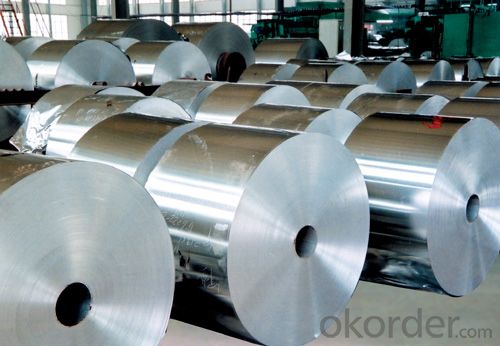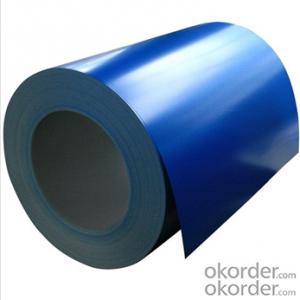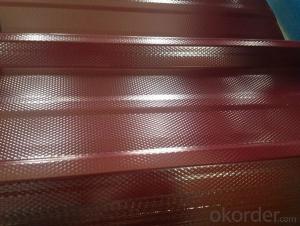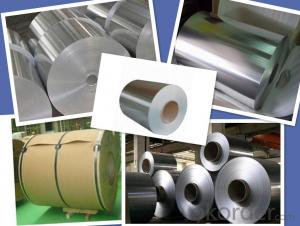Ruud Aluminum Coils Price Wholesale Aluminum Coil in China
- Loading Port:
- China Main Port
- Payment Terms:
- TT OR LC
- Min Order Qty:
- -
- Supply Capability:
- -
OKorder Service Pledge
OKorder Financial Service
You Might Also Like
Aluminium alloys (or aluminumalloys; see spellingdifferences) are alloys in which aluminium(Al) is the predominant metal. The typical alloying elements are copper, magnesium,manganese,silicon,tin and zinc. There are twoprincipal classifications, namely casting alloys and wrought alloys, both of which are furthersubdivided into the categories heat-treatableand non-heat-treatable. About 85% of aluminium is used for wrought products,for example rolled plate, foils and extrusions.Cast aluminium alloys yield cost-effective products due to the low meltingpoint, although they generally have lower tensilestrengths than wrought alloys. The most important cast aluminiumalloy system is Al–Si, where the high levels of silicon (4.0–13%)contribute to give good casting characteristics. Aluminium alloys are widelyused in engineering structures and components where light weight or corrosionresistance is required
Alloy: AA1050, 1060, 1100, AA3003, 3005, 3015, 5052, 5754, 5083,8011,etc
Temper:H14/16/18/22/24/32,HO etc.
Thickness:0.2mm—100mm
Width:100mm—2300mm (Can be slitted)
InnerDiameter: 508MM
CoilWeight:500kg-3000kg(Max.)
Application: Foil stock, Circles, Roofing, Canstock, Marine plate,Anti-sliperypurpose in vehicles, packing and appliance.
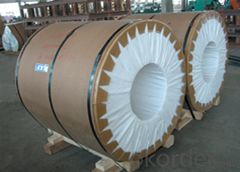
- Q: Are aluminum coils suitable for solar reflectors?
- Yes, aluminum coils are indeed suitable for solar reflectors. Aluminum has high reflectivity, making it an ideal material to redirect and focus sunlight onto solar panels or other solar energy systems. Its lightweight nature and resistance to corrosion also make it a practical choice for solar reflectors.
- Q: This question asks for methods to preserve the lifespan of an aluminum coil.
- <p>To maintain an aluminum coil and ensure its longevity, follow these steps: Store the coil in a cool, dry place away from moisture and direct sunlight. Keep it clean by regularly removing dust and debris. Avoid scratching or denting the coil's surface. Handle the coil carefully to prevent damage. Use appropriate lubricants when necessary to reduce friction. Regularly inspect the coil for any signs of corrosion or wear and address these issues promptly. By following these practices, you can extend the life of your aluminum coil and maintain its quality.</p>
- Q: Explain how aluminum coils are connected to electronics.
- <p>Aluminum coils play a significant role in the electronics industry due to their high electrical conductivity and low density. They are used in various components such as transformers, inductors, and chokes, where they help in the conversion and regulation of electrical energy. Aluminum's non-magnetic properties make it ideal for parts that need to be shielded from magnetic fields. Additionally, aluminum coils are used in heat sinks to dissipate heat generated by electronic devices, ensuring their efficient operation and longevity.</p>
- Q: How many companies have used aluminum coil?
- Too many. All the companies who make the aluminum products you have seen in daily life have used it. So it is hard to explain.
- Q: What are the different color options for anodized aluminum coils?
- The different color options for anodized aluminum coils include silver, gold, bronze, black, blue, red, green, and various shades of gray.
- Q: Are aluminum coils suitable for food and beverage packaging?
- Yes, aluminum coils are suitable for food and beverage packaging. Aluminum is a versatile material that offers various advantages for packaging applications. It is lightweight, making it easy to transport and handle. Aluminum is also highly resistant to corrosion, which ensures that the packaging remains intact and protects the contents from external factors. Additionally, aluminum has excellent thermal conductivity, allowing for efficient heat transfer, which is beneficial for food and beverage products that require temperature control. It is also impermeable to light, moisture, and oxygen, providing an excellent barrier to maintain the quality and freshness of the packaged items. Furthermore, aluminum is recyclable and can be reused, making it an environmentally friendly choice for packaging. Overall, aluminum coils are a reliable and suitable option for food and beverage packaging due to their durability, protective properties, and sustainability.
- Q: I'm trying to cast aluminum using plaster and i was wondering if any one know how much the plaster has to be baked and how to tell if the plaster is dried fully and ways to do it. thx
- When okorder /... Aluminum melts at about 1200 F. Silver at about 1700 F. So this would work fine. You would need a Kiln to heat the investment up to these temps - in a pinch a ceramic kiln would work. If you don't get all the moisture out the mold could explode from steam pressure - be careful - read some books or visit some backyard casting sites. Aluminum is also cast using sand casting techniques.Good luck.
- Q: Can aluminum coils be used in coil coating processes?
- Yes, aluminum coils can be used in coil coating processes. Aluminum is a commonly used material for coil coating due to its durability, lightweight nature, and resistance to corrosion. It can be easily coated with various finishes and colors, making it suitable for a wide range of applications in industries such as construction, automotive, and appliances.
- Q: Can aluminum coils be used in high-humidity environments?
- Yes, aluminum coils can be used in high-humidity environments. Aluminum is a corrosion-resistant metal, making it suitable for applications in areas with high humidity levels. The natural oxide layer that forms on the surface of aluminum acts as a protective barrier against moisture and prevents the metal from rusting or corroding. This makes aluminum coils a popular choice for HVAC systems, where they are exposed to moisture and humidity on a regular basis. Additionally, aluminum coils are lightweight, durable, and have excellent heat transfer properties, making them an ideal choice for various industrial and commercial applications in high-humidity environments.
- Q: Is it safe to use aluminum coil for food storage?
- <p>Using aluminum coil for storing food is not recommended. Aluminum can react with acidic or alkaline foods, potentially leaching aluminum into the food. This can be harmful to health, especially over time. Instead, opt for food-safe materials like glass, stainless steel, or BPA-free plastics for food storage to ensure safety and prevent contamination.</p>
Send your message to us
Ruud Aluminum Coils Price Wholesale Aluminum Coil in China
- Loading Port:
- China Main Port
- Payment Terms:
- TT OR LC
- Min Order Qty:
- -
- Supply Capability:
- -
OKorder Service Pledge
OKorder Financial Service
Similar products
Hot products
Hot Searches
Related keywords
